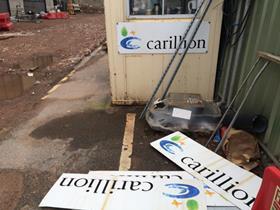Failed contractor paid out at least £3.1m three days before entering liquidation
Carillion was haemorrhaging millions of pounds to pay advisers bills in the days leading up to its collapse.
Documents released by the MPs running the inquiry into Carillion’s collapse have revealed the company was paying out millions to firms advising on how to turn the company around just three days before it failed.
On 12 January, the day Carillion’s board were attempting to secure an emergency £10m loan from the government, they paid out at least £3.1m in consulting fees.
But the government refused and Carillion was forced into liquidation 72 hours later.
Responses from accountants PwC and EY and FTI Consulting show the amounts they were paid that day: EY was paid £190,000, while PwC was paid £230,000. FTI said “£837k (excluding expenses and VAT) was paid on or around that date”.
The co-chairs of the inquiry Frank Field and Rachel Reeves said: “There are many losers from the Carillion calamity: employees, pensioners, suppliers and the well-run businesses that pay the PPF levy. Many of those face an anxious wait to see what the consequences of the gross failings of corporate governance and accounting will be for them, their businesses and their families.
“Not so these omnipresent consulting giants, who can always be relied upon to emerge enrichened from any crisis. As everything collapsed around them, they were merrily cashing cheques.”
The inquiry also released details of Carillion’s draft Independent Business Review, with extracts from the review revealing there had been a negative analysis of the firm’s positionfor an extended period of time.
It said the firm’s net debt had been “aggressively managed through the short term deferral of payments, acceleration of receipts and receipt of short term loans from JVs”.
It added: “The detailed presentation and availability of robust historical financial information is extremely weak; in particular as it relates to the historical working capital movements of the group (which are the principal drivers of cash flow) and business unit profitability.
“This is in part due to poor accounting information systems, a lack of senior finance resource/bandwidth at group level and weak corporate knowledge in view of extensive management changes throughout the business.”
On Wednesday, three restructuring partners from EY are due before MPs in the latest round of evidence being heard as part of the parliamentary inquiry into Carillion’s collapse.




























No comments yet